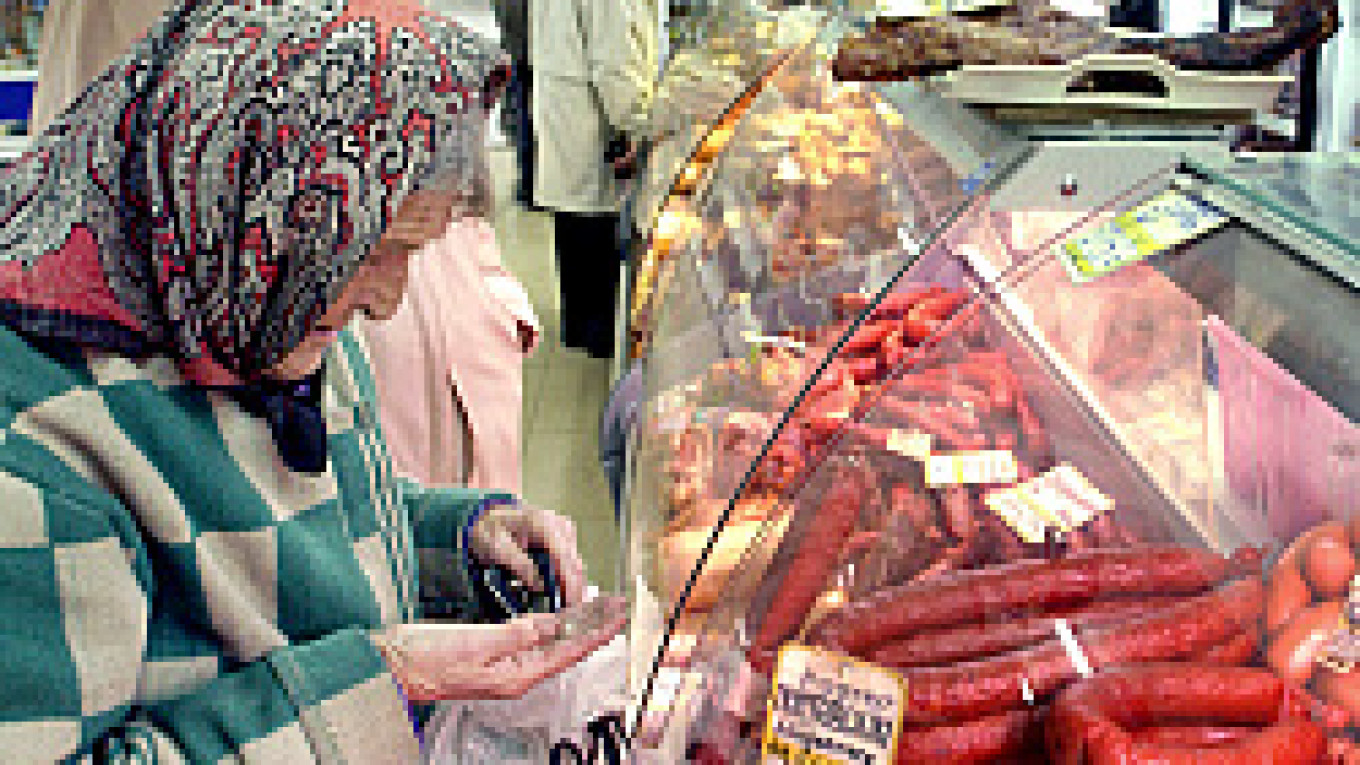The country's prosperity is built on eight successive years of expansion, a sixfold increase in average incomes and almost $500 billion of currency reserves. They contribute to Putin's inability to contain consumer-price growth, which overshot its target in every one of his eight years as president except 2003.
Medvedev, the likely next president, must find ways of containing inflation that accelerated to 11.9 percent in 2007. Failure to do so may trigger unsustainable wage demands, squeeze consumer spending and dent company profits.
"It's the biggest macroeconomic problem Russia faces right now," said Roland Nash, chief strategist at Renaissance Capital. "If you look at any public survey, they all say the same thing. It's absolutely a political issue, but it has an economic solution. It will be a test for Medvedev."
At the same time, Medvedev will have "no real tools" for meeting an annual inflation target of 8.5 percent, said Anton Struchenevsky, an economist at Troika Dialog.
Monetary policy is not effective because the country still has not developed a fully fledged consumer-credit market. Mortgages are few, and credit-card use is in its infancy outside the biggest cities.
Cash dominates transactions, with almost 90 percent of cards used only to withdraw rubles from bank accounts, according to Anatoly Aksakov, a member of the State Duma's Committee on Credit Organizations and Financial Markets.
"Inflation is undoubtedly the most serious problem the government will face after the election," said former acting Prime Minister Yegor Gaidar, who abolished Soviet-era price controls in 1992, after which inflation climbed above 2,000 percent. It will be "a serious blow to the long-term potential of the economy," said Gaidar, now head of the Institute for the Economy in Transition.
The soaring amount of money entering the economy from energy revenue, share sales and foreign investment is not helping. M1 money supply rose by 28 billion rubles ($1.16 billion) to 4 trillion rubles ($166 billion) in the week ended Feb. 18, up from 700 billion rubles ($29 billion) in April 2002.
"Growth in money supply in Russia has been very large, well in excess of nominal gross domestic product, and this is a major factor, I think, in the upward pressure" on prices, former Federal Reserve Chairman Alan Greenspan told a Moscow investor conference on Jan. 30.
The Central Bank's dilemma is a finding policy that targets both the exchange rate and inflation. It uses the reserves to manage the ruble, pumping money into the economy to weaken the currency and stoking inflation. Finance Minister Alexei Kudrin said last month that Russia would move to a floating exchange rate by 2011.
"I don't think Russia is going to make it in three years without allowing much faster exchange-rate appreciation," said Kenneth Rogoff, a professor at Harvard University and former chief economist at the International Monetary Fund. "The current macropolicy is unsustainable."
A 40 percent jump in government spending and record net capital inflow of $82.3 billion in 2007 also spurred price growth.
The average monthly wage reached 18,467 rubles ($767) in December; the average monthly pension was 3,309 rubles ($137).
Food comprises 40 percent of the average consumer basket, according to the Federal Statistics Service. Forty-one percent of Russians spend more than half their income on food, according to a January poll by the All-Russia Center for the Study of Public Opinion. Sixty-eight percent have no savings, the poll found.
Public transport, funerals and housing maintenance have become more expensive. Utilities prices jumped an annualized 16 percent in January, when the government traditionally imposes the largest increases on water, gas, heat and electricity.
"For many, the situation is much worse than what the official figures show," said Natalya Tikhonova, chief of social policy research at the Moscow-based Institute of Sociology of the Russian Academy of Sciences. "The poor are hardest hit."
To rein in prices, the government cut dairy and vegetable-oil import duties and persuaded companies including Wimm-Bill-Dann and retailer X5 to freeze prices on some milk, egg and bread products until May 1.
In 1998, inflation was 84.4 percent and the government defaulted on $40 billion of debt. The Central Bank has accumulated $481.3 billion in reserves, while wages have grown an average 14.4 percent a year since 2000.
At the same time, "accelerating inflation has a direct impact on growth," said Vladimir Tikhomirov, chief economist at UralSib. It makes borrowing more expensive, enticing companies and individuals to reduce the spending that helped the economy expand 8.1 percent in 2007, he said.
The result is acutely felt among families like Sergei Polyakov's. The worker at the Balt Keramika brickmaking factory in the Kaliningrad region said his 74-year-old mother, who worked as a teacher for 35 years and receives a state pension, can't afford both food and utilities payments.
"Everything is just getting more expensive, from food to everything else," Polyakov said. "I have to help her live."
A Message from The Moscow Times:
Dear readers,
We are facing unprecedented challenges. Russia's Prosecutor General's Office has designated The Moscow Times as an "undesirable" organization, criminalizing our work and putting our staff at risk of prosecution. This follows our earlier unjust labeling as a "foreign agent."
These actions are direct attempts to silence independent journalism in Russia. The authorities claim our work "discredits the decisions of the Russian leadership." We see things differently: we strive to provide accurate, unbiased reporting on Russia.
We, the journalists of The Moscow Times, refuse to be silenced. But to continue our work, we need your help.
Your support, no matter how small, makes a world of difference. If you can, please support us monthly starting from just $2. It's quick to set up, and every contribution makes a significant impact.
By supporting The Moscow Times, you're defending open, independent journalism in the face of repression. Thank you for standing with us.
Remind me later.


